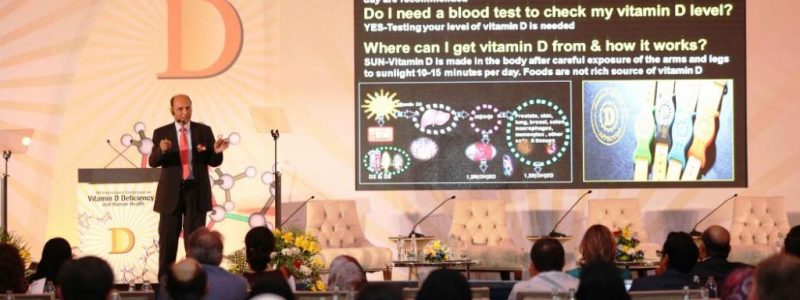New Updates on Vitamin D
The two-day “6th International Conference on Vitamin D Deficiency – Nutrition and Human Health” was held on the 9th and 10th of March 2017 at Intercontinental Hotels & Resorts, Abu Dhabi, United Arab Emirates. This year the conference focused on Vitamin D Deficiency – Nutrition and Human Health. The event was successfully organised and managed by Medetarian Conferences Organizing (MCO) – the team headed by Dr. Mohammed Abuelkhair, a frequent speaker at national and international conferences whose major area of research is in drug safety and rational drug use.
Experts Share Research on Vitamin D
Dr Afrozul Haq, Founding President of the conference of Vitamin D Deficiency is a strong supporter of Vitamin D Research in the UAE. “Vitamin D is an essential vitamin and a hormone for human growth potential and for survival. It may prevent many bone disorders, such as rickets in children and osteomalacia in adults, osteoporosis, and osteopenia. While it is highly widespread in countries with limited sun light, it also prevalent in sunny countries like the United Arab Emirates and the whole of Middle East and South East-Asia”, said Dr Haq.
Prof. Dr Seyed Ehtesham Hasnain, Ph.D. (JNU, Delhi), D.Sc. (h.c.), D. Med. Sc. (h.c), was the Chief Guest of the Conference. He is a Padma Shri holder and has received Germany’s Highest Civilian Award – The Order of Merit (Das Verdienstkreuz, 1.Klasse), from the President of Germany, equivalent of India’s Bharat Ratna.
Prof. Michael F Holick, Department of Medicine, Boston University Medical Center, Boston said that Vitamin D deficiency and insufficiency is a Global health problem. Globally 40 per cent of children and adults are considered to be vitamin D deficient and an additional 20 per cent insufficient. Vitamin D deficiency causes rickets in children and osteoporosis and osteomalacia in adults. It is also associated with muscle weakness and increased risk for falling. Very few foods naturally contain vitamin D but in some countries vitamin D fortification is practiced and has been beneficial for improving the vitamin D status of children and adults.
Prof. Carsten Carlberg, Institute of Biomedicine, University of Eastern Finland, Kuopio, Finland, informed that humans are able to synthesize vitamin D3 in their skin when exposed to UV-B but seasonal variations, textile coverage and predominant indoor activities often make supplementation with the compound necessary. A wide range of vitamin D sensitive molecular parameters, such as changes in the epigenetic status and the respective transcription of genes of mobile immune cells from blood or the level of proteins or metabolites in serum, can be used to assess the vitamin D response index.
Check out our upcoming conferences now!
